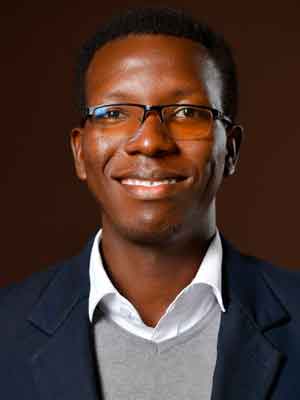Berkeley Public Health student profile: Innocent Menyo
Winner of the 2023 Dean's Health Equity and Leadership scholarship

- Online MPH, Epidemiology and Biostatistics
- Expected graduation: 2025
- Hometown: Kampala, Uganda
- Preferred pronouns: he/him/his
Berkeley Public Health: Why did you choose to go into public health and why did you choose Berkeley Public Health for your degree?
Innocent Menyo: For the last six years, I have worked closely with low-resource communities through M-SCAN Uganda. Through this program, we have developed portable, affordable, and power-efficient ultrasound devices that work on laptops, tablets, and mobile phones and can detect complications early in pregnancy.
In the communities I have worked with—including refugee settlements—I have seen the social determinants of health at full play. Many pregnant women lack basic care, such as simple diagnostic tools, clean delivery spaces, and so much more.
My interest in public health is sparked by my desire to improve the health of these communities through better understanding of the key determinants of health, of challenges to the delivery of key diagnostic tools like ultrasound devices, and through use of human-centered design that would incorporate research findings from the communities themselves into work flows that guide best delivery and execution of public health innovations.
Since UC Berkeley is a leading institute in public health, it has been my dream university for years. Seeing this dream come true is unbelievable. UC Berkeley’s special emphasis on public health practice will offer me the skill set I need to positively impact the communities I serve.
The UC Berkeley Innovators network is an amazing space and opportunity for me to expand the ideas I have and scale the innovations I have already worked on. While at UC Berkeley, I plan to research portable ultrasound devices and ultrasound patches and hope to contribute to better diagnostics, especially in low-resource settings.
Why did you choose your concentration and what interests you about it?
So far, the M-SCAN Uganda program has carried out at least 4,000 scans with more data coming monthly from over 25 health centers. The program needs someone with a special skill set to analyze this data. This sparked my special interest in epidemiology and biostatistics. Through tools such as regression models, we can draw a lot of meaning from the data.
You received the Dean’s Health Equity and Leadership scholarship. What does that mean to you? Can you tell us more about your thoughts on health equity?
My excitement was through the roof when I received news that I was recipient of this prestigious and very competitive award from UC Berkeley School of Public Health.
This is a validation for the work I do at M-SCAN serving pregnant mothers across Uganda. I believe that everyone irrespective of their social, economic, geographical, or political class deserves quality health care and, as such, we all have a part to play in achieving health equity. With an experience of seeing the many health disparities existing in low resource settings, I believe attention to health equity at all levels, starting with the most remote and most rural, is much needed to eliminate such disparities through a 360 degree approach to existing challenges in such communities.
What element of public health would you most like to change?
Last mile health delivery of affordable diagnostic equipment, especially the more portable, affordable, and energy-efficient ultrasound devices with clear mapping from training, deployment, risk detection, intervention, and referral where necessary.
What would you like to do with your degree after graduation?
I’m looking forward to advancing research and innovation in the context of low-resource diagnostics, with a focus on ultrasound delivery to low-resource settings.
Through Berkeley Innovators, I plan to innovate more and bring more impactful products to patients, partner with more innovators, and create a consortium that backs up local researchers carrying out research in low-resource settings in Africa.
How do you think Berkeley Public Health will set you up for success in your future career?
The vast resources at Berkeley Public Health will offer space for me to become a successful public health specialist and even a better epidemiology/biostatistician specialist with cutting-edge research and informative data analytical skill sets.